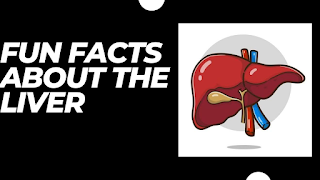Fun facts about the liver
The liver is a remarkable organ that plays a crucial role in maintaining our overall health and well-being. Located in the upper right side of the abdomen, the liver performs over 500 vital functions that are essential for our survival. While many of us are familiar with its role in detoxification and metabolism, there are numerous fascinating and lesser-known facts about the liver that make it truly awe-inspiring. In this article, we will explore fun facts about the liver that will leave you amazed at the wonders of this incredible organ.
1. Regenerative Superstar
The liver is alone organ in the human body capable of regenerate itself. When damaged, it can regrow and return to its normal size within a matter of weeks. Even if up to 70% of the liver is removed, it can still regenerate back to its full size. This remarkable regenerative ability makes it a vital asset for the body's healing process and sets it apart from other organs.
2. Heavyweight Champion
Weighing in at approximately 3 pounds (1.4 kilograms) in the average adult, the liver is the largest solid organ in the body. It is responsible for a wide range of essential functions, including metabolizing nutrients, detoxifying harmful substances, and producing bile to aid in digestion. Without a doubt, the liver is a heavyweight champion that silently works behind the scenes to keep our bodies in top shape.
3. Metabolic Powerhouse
One of the liver's primary functions is to regulate metabolism. It plays a key role in the breakdown, storage, and utilization of carbohydrates, proteins, and fats. The liver helps maintain a steady supply of glucose in the bloodstream, ensuring that our body's energy needs are met even during fasting or strenuous exercise. This metabolic flexibility is critical for our body's day-to-day activities.
4. Bile Factory
The liver produces bile, a greenish-yellow fluid that aids in the digestion of fats. The gall is stored in the gallbladder and released into the small intestine when needed. Interestingly, bile is also responsible for giving stool its characteristic brown color, as it helps break down waste products and metabolites in the body.
5. Blood Filter
Every drop of blood from the digestive system flows through the liver before reaching the rest of the body. The liver acts as a blood filter, removing toxins, old blood cells, and other harmful substances. This detoxification process is vital for maintaining a healthy bloodstream and preventing harmful substances from entering our circulation.
6. Vitamin Warehouse
The liver plays a crucial role in storing essential vitamins and minerals, including vitamins A, D, B12, iron, and copper. It releases these nutrients into the bloodstream as needed, ensuring our body's nutritional requirements are met even during periods of limited dietary intake.
7. Immune Guardian
As a part of the reticuloendothelial system, the liver plays a critical role in the body's immune defense. It helps remove bacteria, viruses, and other foreign particles from the bloodstream, contributing to our immune system's ability to fight off infections and diseases.
8. Silent Operator
The liver is a silent operator, often not causing noticeable symptoms until it is significantly damaged. Conditions like fatty liver disease, viral hepatitis, and cirrhosis can progress silently, making regular check-ups and healthy lifestyle choices vital for maintaining liver health.
9. Gender Difference
Research indicates that the metabolism and function of the liver can vary between genders. For example, women may metabolize certain drugs differently than men, potentially impacting drug efficacy and dosage requirements. Understanding these gender differences can lead to more personalized medical treatments in the future.
10. Emotional Connection
In various cultures and historical beliefs, the liver has been associated with emotions and spirituality. In ancient civilizations like Egypt, Greece, and China, the liver was considered the seat of emotions and intellect. Even today, expressions like "liver-deep emotions" or "venting your liver" indicate the historical link between emotions and this incredible organ.
Conclusion
The liver is truly a remarkable organ, with its regenerative ability, vital functions, and intricate contributions to our overall health. As we continue to delve into the complexities of this magnificent organ, we gain a deeper appreciation for the wonders of the human body. Taking care of our liver through a healthy lifestyle, balanced diet, and regular medical check-ups is essential for ensuring its continued contribution to our well-being. So, let's celebrate the liver's magnificence and raise a toast to this unsung hero of our bodies!












0 Comments